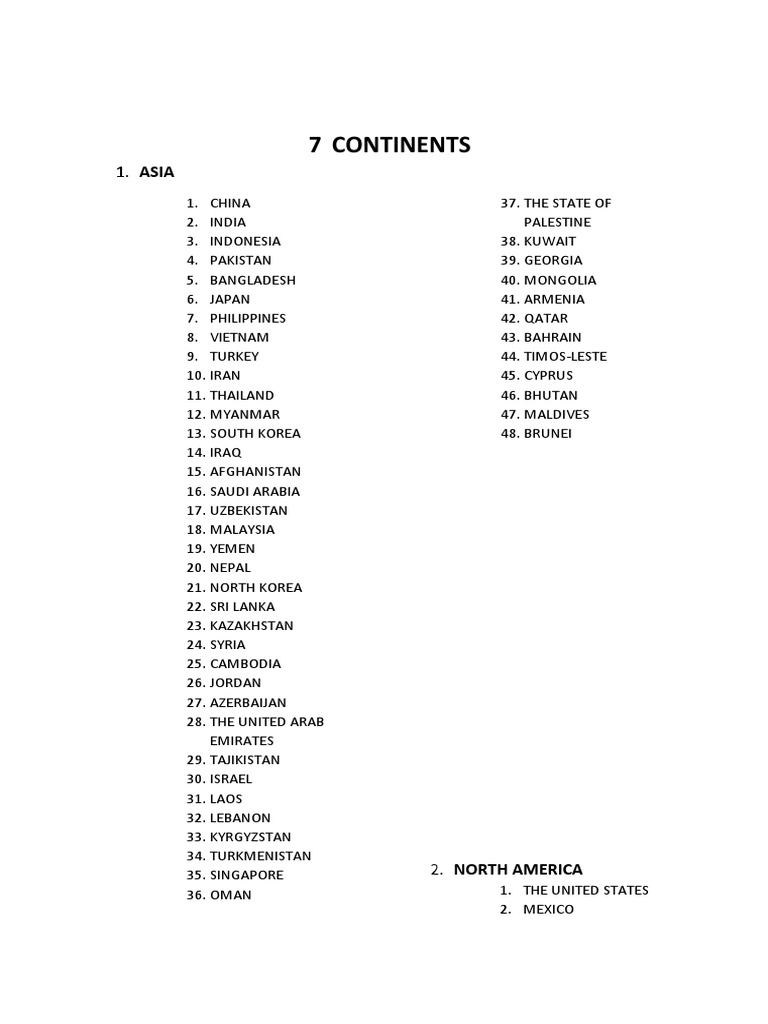The world, a grand mosaic of life and culture, is divided into seven distinct continents, each embodying unique characteristics, landscapes, and peoples. From a Christian perspective, these continents are not merely geographical distinctions but rather a testament to God’s wondrous creation. Each landmass urges us to explore its distinctiveness, revealing an intrinsic connection to our faith and the stories of creation. Here, we embark on an exploration of the seven continents, envisioning them as vibrant threads woven into the divine fabric of our planet.
Africa: Often regarded as the cradle of civilization, Africa pulsates with the heartbeat of humanity’s origins. Rich in diversity, it boasts over 3,000 distinct ethnic groups and languages. This continent envelops its inhabitants in a tapestry of spiritual beliefs, with Christianity flourishing alongside indigenous faiths. The renowned Great Rift Valley, a geological marvel, illustrates the land’s ancient history and signifies God’s creativity. In the lush savannas and the expansive Sahara, we see reminders of biblical narratives—of journeys, trials, and triumphs. Africa’s call for stewardship resonates deeply in Christian doctrine, prompting believers to care for creation as a reflection of their faith.
Asia: Asia, the largest and most populous continent, is akin to an intricate scroll revealing the various chapters of human history. It is a land brimming with contrasts: from the serene Himalayan peaks to the bustling streets of Tokyo. In Christian thought, Asia holds significant weight; it is here that the roots of many pivotal faith narratives lie. The stories of the Apostles, including the journeys of Paul traversing through Asia Minor, weave a rich spiritual legacy. The presence of diverse cultures and traditions within Asia reminds Christians of the universal message of the Gospel, echoing Jesus’ call to reach all nations. The continent’s myriad of philosophies and religions invites reflection on the quest for truth, akin to the pursuit of divine understanding.
Europe: Europe stands as a monument to history, culture, philosophy, and faith. This continent became the epicenter of the Christian faith, where the Church’s early foundations were laid in Rome and Constantinople. From the grandeur of Gothic cathedrals to the rolling hills of Tuscany, Europe embodies a rich spiritual heritage that has influenced Western civilization profoundly. Europe’s intellectual contributions in theology, philosophy, and art serve as a luminous backdrop against which Christians reflect on the beauty of creation. This land is a canvas painted with the struggles and triumphs of faith—showcasing both the reformation’s liberating power and the continuing dialogues between religion and modernity.
North America: North America pulsates with the spirit of exploration and innovation, inviting a fresh understanding of purpose and fulfillment. From its vast unspoiled wilderness to its vibrant urban centers, the continent embraces a diverse tapestry of cultures and ideologies. The faith landscape here is as varied as its demographics. North America presents opportunities for Christian doctrine to engage with contemporary challenges and societal shifts, showcasing the relevance of faith in the modern context. Here, Christians are called to be instruments of hope in a rapidly changing world, channeling their beliefs into acts of service and compassion across the many communities. The continent’s spirit of freedom resonates with the Christian message of liberation and grace.
South America: South America is a vivid tableau where faith and culture coalesce in vibrant expression. The Andes rise majestically, echoing the Spirit’s ascending presence, while the Amazon flows as a lifeblood to the land and its people. Christianity arrived here through complex historical intersections, and today, it flourishes in unique forms. The indigenous populations blend ancient customs with Christian practices, creating rich celebrations of faith. This interplay of traditions reflects the gospel’s transformative power, engaging believers in a dialog with their heritage. The call for social justice and environmental stewardship is paramount in this continent, aligning with biblical principles of caring for the needy and for God’s creation.
Australia: Australia, often perceived as far removed from the traditional centers of Christian thought, surprises with its own unique narrative. It is a land of paradoxes, home to vast deserts and lush coastlines, balancing indigenous cultural heritage with Western influences. The Christian presence here grapples with dialogue and reconciliation, engaging with First Nations peoples to foster understanding and respect. Australia’s diverse ecosystems evoke a profound sense of stewardship among believers, echoing the Genesis mandate to care for the earth. This continent challenges Christians to reflect on their role in promoting unity and healing in a divided society, urging them to embrace the Gospel’s call to love and compassion.
Antarctica: Lastly, we look to Antarctica, the enigmatic and scarcely populated continent. While it may appear devoid of human habitation, its existence offers a poignant reflection on God’s creativity, revealing a landscape of breathtaking beauty and pristine wilderness. Here, believers might contemplate the majesty of creation—the ice formations standing like monuments to divine artistry. Though silent, Antarctica prompts conversations about stewardship, urging those of faith to protect even the most remote corners of the earth. The continent embodies a space for solitude and contemplation, inviting Christians to reflect on their relationship with creation and the call to protect it.
In summation, the seven continents of our world are much more than just geographical entities. They serve as a profound reminder of the various expressions of human existence intertwined with a rich spiritual legacy. Each continent, in its unique character, invites reflection, exploration, and a deeper understanding of the divine tapestry of creation. Through faith, Christians can engage with these diverse lands and their narratives, fostering a spirit of connection and stewardship that enriches not only individual lives but also the global community in which we all exist.



